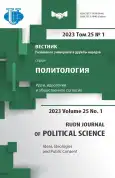Состояние и перспективы отношений России и стран Запада на фоне украинского кризиса в фокусе китайской общественно-политической экспертизы
- Авторы: Маккавеева С.С.1, Хуан Д.1
-
Учреждения:
- Шаньдунский университет
- Выпуск: Том 25, № 1 (2023): Идеи, идеологии и общественное согласие
- Страницы: 175-188
- Раздел: ИДЕИ И ИДЕОЛОГИИ В МЕЖДУНАРОДНОМ КОНТЕКСТЕ
- URL: https://journal-vniispk.ru/2313-1438/article/view/322251
- DOI: https://doi.org/10.22363/2313-1438-2023-25-1-175-188
- ID: 322251
Цитировать
Полный текст
Аннотация
Российско-украинский конфликт является самым серьезным кризисом в международных отношениях после холодной войны. Это не только переломный момент в российско-украинских отношениях, но и глубокий кризис в российско-западных отношениях, который ознаменовал собой изменение подхода Москвы к отношениям с Западом и переход от прошлого диалога к сегодняшней борьбе. Китай, как третья сторона в российско-украинском конфликте, с самого начала занял независимую позицию, и игнорировал любые просьбы Запада хоть как-то повлиять на Россию. Принимая во внимание отношения России и Китая, которые с каждым днем становятся только крепче, позиция Китая все больше стала привлекать внимание западных СМИ, и Пекин столкнулся с обвинениями со стороны Запада в поддержке специальной военной операции России на Украине. Исследование представляет собой дискурс-анализ публикаций китайских академических экспертов в СМИ и контент-анализ популярных сайтов СМИ КНР, таких как CCTV News, The Paper, Guanchazhe за период 1 апреля 2022 г. до 1 октября 2022 г. В ходе исследования авторы приходят к выводу, что китайские СМИ преимущественно нейтрально освещают события на Украине, стараются балансировать и не критиковать Москву, когда речь заходит об отношениях России и Запада. А китайские эксперты, рассуждая о российско-украинском конфликте и отношениях между Москвой и Западом, имеют разные взгляды и размышления. Некоторые китайские аналитики рассуждают о победе России над Западом, а другие говорят о том, что Россия вполне может оказаться ни с чем. В заключении авторами делается вывод, что Запад и Россия могут погрузиться в новую холодную войну, и эта холодная война может оказаться еще более жестокой, чем прошлая по трем основным причинам: из-за всеобъемлющего военного противостояния, экономической изоляции и разрыва гуманитарных связей.
Об авторах
Светлана Сергеевна Маккавеева
Шаньдунский университет
Email: sveta_grase@mail.ru
ORCID iD: 0000-0001-9846-8397
аспирант Института политологии и государственного управления
Циндао, Шаньдун, КНРДэнсюэ Хуан
Шаньдунский университет
Автор, ответственный за переписку.
Email: dengxue@sdu.edu.cn
ORCID iD: 0000-0003-1306-3038
профессор Института политологии и государственного управления, заместитель директора Центра исследований России и Центральной Азии
Циндао, Шаньдун, КНРСписок литературы
- Blokhin, K.V. (2022). Russia and the West. Military-political conflict in 2022. Changing the rules of the game. Free Thought, (2), 25–34. (In Russian).
- Chen, G. (2017). Properly handle the principle of non-interference in internal affairs and constructive. China and the World in 2016. Beijing: Social Science Literature Publishing House, 116–122. (In Chinese).
- Di, Meglio, R. (2005). The evolution of the Just War tradition: Defining Just Post Bellum. Military Law Review, 186, 116–163.
- Lukyanov, V.Y. (2022). Post-Soviet Space in the Context of Russia-West Relations: Problems and Prospects. Bulletin of the Northern (Arctic) Federal University. Series: Humanities and social sciences, 22(2), 59–69. (In Russian). https://doi.org/10.37482/2687-1505-V164
- Podberezkin, A.I. (2022). NATO is the basis of the pro-American military-political coalition of the West. Observer, 3–4, 5–21. (In Russian). https://doi.org/10.48137/2074-2975_2022_3-4_5
- Yan, X. (2022). China’s Ukraine Conundrum — Why the War Necessitates a Balancing Act. Foreign Affairs Journal, 101(3), 1–8.
- Zhang, H. (2022). Russia and the West: from dialogue to confrontation. Contemporary world, 3, 72–73. (In Chinese).
Дополнительные файлы









